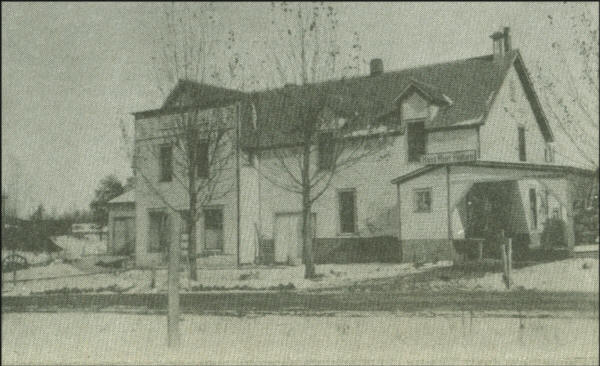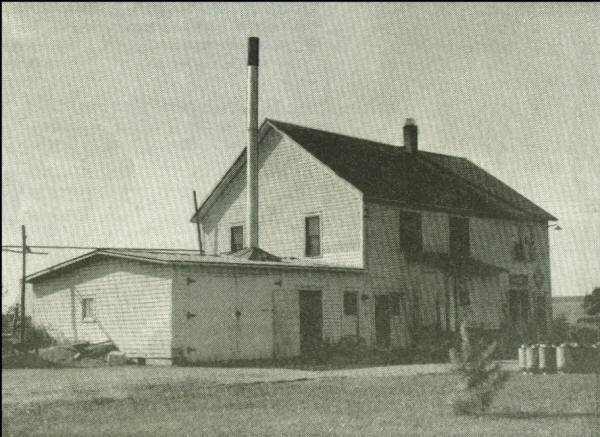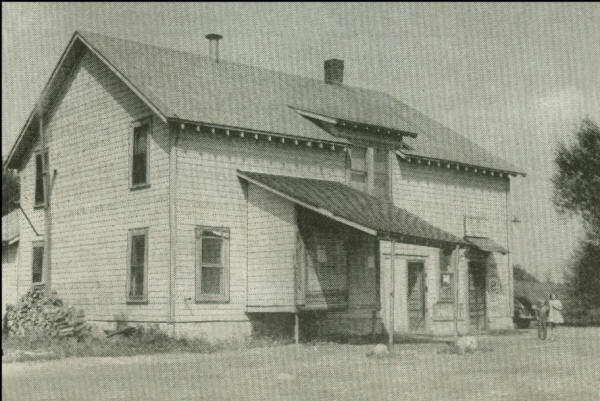|
|
|
Clark County Press, Neillsville, WI August 7, 1996, Page 22 Transcribed by Dolores (Mohr) Kenyon. Index of "Oldies" Articles |
|
|
|
Clark County Press, Neillsville, WI August 7, 1996, Page 22 Transcribed by Dolores (Mohr) Kenyon. Index of "Oldies" Articles |
Good Old Days
By Dee Zimmerman
“Going to town on Saturday Night”
A familiar phrase heard in the 30’s and early 40’s was, “We are going to town on Saturday night.” Townspeople and farm families alike looked forward to the Saturday evening shopping trips during the summer months.
Those living on the farms planned their Saturday work schedule allowing an early quitting time. It was also bath night when each one took their turn bathing in the big aluminum wash tub for the weekly “clean-up.” Everyone would dress up in clean, freshly ironed clothes and were ready for the ride into town.
Some townspeople drove their family car up town during the day, parking in a prime location, the hub of shopping activity, so they could just “people watch” when shopping was done. Another reason was, as they sat in their car, with windows rolled down, they could “chit-chat” with those walking by. After all, you knew everyone and everyone knew you. When a new family moved to the area, they weren’t “new” for long as everyone made it a point “to get acquainted” and make the newcomers feel welcome to the community.
My mother always had about 100 laying hens each year. The eggs were gathered daily, washed and carried to the cellar to be kept cool until the Saturday trip to town. Our first stop in town was at the produce and feed store to sell the 20 to 24 dozen eggs. Cash was paid out on the sale and that was mom’s money to be used for shopping purchases. Occasionally, leaving the produce store, she would have to buy a fifty pound bag of “laying mash” the hens laid more eggs if fed that, daily. The feed bags were made of colorful print materials so mom would choose a print she liked for a certain sewing project.
Once a parking space was found and the car parked, everyone was out and on their way. Mom knew the prices at each store, so chose where each needed item was to be bought. After all, a penny’s difference here and there added up and could mean being able or not able to buy some needed article. My dad enjoyed visiting, so would pass the time commiserating with fellow farmers about the crops. Depression and drought of the thirties seemed to bring people closer together, to be able to talk about the circumstances made it easier to cope. Those who didn’t like talking about their situations, retreated to the pool hall, (every town had one) and played cards. When passing the pool hall, you could look through the open door and see a cloud of smoke from cigars, cigarettes and pipes that hung heavy over the card tables.
When we kids were old enough, we could accompany friends into the stores, with orders not to touch anything unless making a purchase. Most kids were given some spending money just before getting out of the car. The younger kids each got a nickel and those of us over seven years old each got a dime.
There was a choice of goodies to be bought for five cents. You could buy an ice cream cone, or a bottle of pop (orange, grape, root beer, cream soda or a coke) or a ten stick pack of Wrigley’s gum or a candy bar (Babe Ruth, Hershey’s, Butter-finger or Bit O’Honey). The decision was sometimes difficult to make.
At the age of six, I desperately tried to learn to whistle. My mom could whistle tunes so well, I begged her to teach me and as much as I tried, it didn’t work. In trying, I made a throat sound, similar to whistling and learned some bird calls.
On our Saturday evening shopping tours in town, gentlemen friends of my parents would ask me to whistle for them. I learned to hold out until they offered me money and one fellow I knew, would offer as much as a dime if I acted shy long enough before whistling. On those evenings, the extra nickels provided me with a good supply of candy and gum to take home for the week.
Neillsville and many other towns held a weekly drawing during the 30’s. The city merchants sponsored a free drawing on shopping night, distributing coupon tickets to customers in their store. At a designated time and place, the drawing for prizes was held to determine the winners. The town would be busy with many shoppers and the streets, including side streets, were lined with cars.
The Neillsville Bank sponsored a free movie at the theatre, a film suitable and enjoyable for family viewing. Towns, without a theatre, provided free movies, also. In a town where we shopped, the owner of a two story corner building painted a large white area on the side street wall to be used as a movie screen. People brought rugs and blankets to place on the ground to sit on for movie viewing, movies were courtesy of the merchants. Some had brought buckets of popcorn, from home, to munch on during the movie.
Drive-in movies became popular circa 1940. Christie had drive-in movies on the west side of Highway 73. The last drive-in movie sight in Clark County is at Abbotsford.
The local high school band played musical selections for hours in the centrally located band shell. Occasionally, other talented musicians or singers would provide entertainment in place of the band.
Lewerenz’s Arbutus Café was bustling with business when shopping errands were completed. The home cooking provided a delicious menu for its customers. The biggest Saturday night seller was the home-made ice cream. The fruit flavored varieties were prepared with freshly picked berries from Lewerenz’s garden. Everyone who wanted a good ice cream cone and for only five cents, knew Arbutus Café had it. Lewerenz’s garden also supplied the fresh vegetables used in the restaurant’s daily food preparation. The business was a family effort, several family members worked together to provide the finest home-cooking for its customers.
Julia Reber’s All-A-Board was a unique and enjoyable place to eat, also serving good food. The former railroad car, remodeled into a café, lingers in many memories. Nel and Hallie Horswill ran it later and then purchased the restaurant across the street, now Cozy Kitchen, and it was referred to as “Horswill’s” for years. On the corner of 6th and Hewett was Becker’s Restaurant. For those who drove out to the Silver Dome to dance from nine to one, they new Becker’s would still be open to serve hamburgers or an early bacon and eggs breakfast to satisfy their hunger before going home.
Sometime in the 40’s shopping night was changed to Fridays.
Saturday evenings became popular for other social events, wedding dances, etc, which the city’s merchants wanted to be able to attend, too. Some complained of the change to Friday night, it meant getting “cleaned-up” two nights in a row. As time went on, Friday nights for shopping waned and eventually “were no more.”
For those of us who lived the Saturday shopping nights, there are many fond memories – memories not to be duplicated in “Mall shopping” and it’s hurried – time-for-no-one-atmosphere.
Last week’s photo of Marathon – Clark Cheese Factory; the factory was on North Main Street in Abbotsford. Its name was derived from the customers it served of both Clark and Marathon County. The building is still on the site, with the business being owned and operated by AMPI.
“Any child can tell you that the sole purpose of a middle name is so he can tell when he’s really in trouble.”
--DENNIS FAKES
 |
The Black River Cheese Factory was located in the community of Clark, ¼ mile south of the Taylor County line or 3 miles north of Withee, 3 miles west on Bridge Road and 1 ¾ miles north on Clark Avenue. It was also along the West Central Railway line and near the Black River. Some of the owners/operators during its existence: Reinhold Buss, Ted Buss and Les Buss
This Clark County Cheese Factory was owned by Ted Braun
 |
Rudy Bachman was the operator/owner of the above cheese factory
 |
The Joe Gubeli cheese factory was in rural Clark County during the 30’s
Reader's Responses
That was My sister and me in the Joe Gubeli Cheese Factory picture above. Since I was born in 1937, this picture would have been taken in 1942 or 43. Joseph F. Gubeli Jr.
|
© Every submission is protected by the Digital Millennium Copyright Act of 1998.
Show your appreciation of this freely provided information by not copying it to any other site without our permission.
Become a Clark County History Buff
|
|
A site created and
maintained by the Clark County History Buffs
Webmasters: Leon Konieczny, Tanya Paschke, Janet & Stan Schwarze, James W. Sternitzky,
|